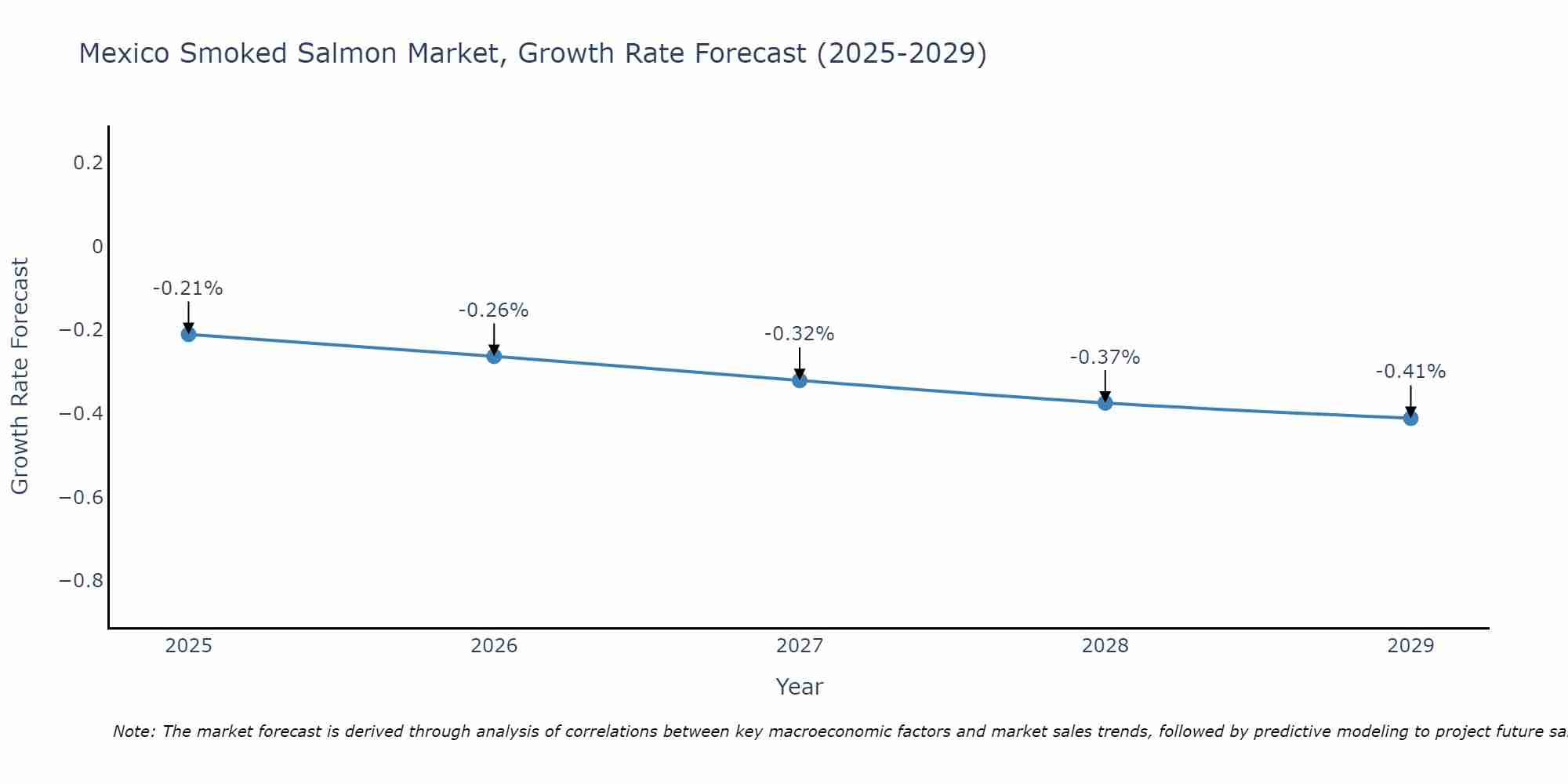Mexico Smoked Salmon Market (2025-2031) Outlook | Growth, Forecast, Size, Industry, Companies, Share, Trends, Analysis, Value & Revenue
| Product Code: ETC387843 | Publication Date: Aug 2022 | Updated Date: Jul 2025 | Product Type: Market Research Report | |
| Publisher: 6Wresearch | Author: Dhaval Chaurasia | No. of Pages: 75 | No. of Figures: 35 | No. of Tables: 20 |
Mexico Smoked Salmon Market Size Growth Rate
The Mexico Smoked Salmon Market may undergo a gradual slowdown in growth rates between 2025 and 2029. Although the growth rate starts strong at -0.21% in 2025, it steadily loses momentum, ending at -0.41% by 2029.

Mexico Smoked Salmon Market Synopsis
The Mexico smoked salmon market is experiencing steady growth driven by increasing consumer demand for premium seafood products and a growing trend towards healthy eating. Smoked salmon is gaining popularity among Mexican consumers due to its convenience, versatility, and perceived health benefits. The market is characterized by a mix of domestic and imported products, with key players focusing on product innovation, quality, and sustainability to attract discerning consumers. The presence of international brands alongside local producers offers a wide range of options for consumers, contributing to market competitiveness. Factors such as rising disposable incomes, changing dietary preferences, and a growing foodservice sector are expected to further fuel the growth of the smoked salmon market in Mexico in the coming years.
Mexico Smoked Salmon Market Trends
The Mexico Smoked Salmon market is experiencing a growing demand due to increasing consumer preference for healthy and convenient food options. There is a rising awareness of the health benefits associated with consuming salmon, such as being rich in omega-3 fatty acids and high-quality protein. This trend is driving more consumers to incorporate smoked salmon into their diets as a versatile ingredient for salads, sandwiches, and appetizers. Additionally, the influence of Western cuisine and a growing food culture emphasizing gourmet and premium products are further boosting the popularity of smoked salmon in Mexico. As a result, food companies are introducing innovative smoked salmon products to cater to the evolving tastes and preferences of consumers in the market.
Mexico Smoked Salmon Market Challenges
In the Mexico Smoked Salmon Market, one of the primary challenges faced is the relatively low consumption of seafood compared to other countries. This leads to a smaller target market for smoked salmon products. Additionally, the cost of importing salmon into Mexico can be high due to tariffs and transportation expenses, which can hinder the affordability of smoked salmon products for consumers. Another challenge is the lack of awareness and familiarity with smoked salmon as a delicacy in Mexican cuisine, leading to lower demand and slower market growth. To address these challenges, companies in the Mexico Smoked Salmon Market may need to focus on educating consumers about the health benefits and versatility of smoked salmon, as well as exploring cost-effective sourcing and distribution strategies to make their products more accessible to a wider audience.
Mexico Smoked Salmon Market Investment Opportunities
The Mexico smoked salmon market presents promising investment opportunities driven by an increasing consumer preference for healthy and premium seafood products. With a growing demand for exotic and gourmet foods in Mexico, there is a rising interest in smoked salmon as a high-protein, convenient, and versatile option. Investing in this market could involve establishing or expanding smoked salmon production facilities, partnering with local suppliers to source high-quality salmon, and developing distribution channels to reach a broader consumer base. Additionally, leveraging digital marketing strategies to promote the health benefits and culinary versatility of smoked salmon could further drive sales in the Mexican market. Overall, investing in the Mexico smoked salmon market offers potential for growth and profitability in a market segment with evolving consumer preferences.
Jordan Agar Market Government Policies
The Mexico Smoked Salmon Market is influenced by various government policies related to food safety, import regulations, and environmental protection. The Mexican government enforces strict food safety standards through agencies like COFEPRIS to ensure that smoked salmon products meet quality and hygiene requirements. Import regulations set by the government dictate procedures for bringing in smoked salmon from other countries, with tariffs and quotas in place to protect domestic producers. Additionally, environmental protection policies impact the industry by regulating fishing practices and sustainability efforts to preserve marine ecosystems. Overall, government policies play a significant role in shaping the Mexico Smoked Salmon Market by ensuring product quality, regulating imports, and promoting sustainable practices in the industry.
Mexico Smoked Salmon Market Future Outlook
The Mexico Smoked Salmon market is expected to witness steady growth in the coming years due to increasing consumer interest in healthy and gourmet food options. Factors such as rising disposable incomes, changing dietary preferences, and a growing awareness of the health benefits of salmon consumption are driving the demand for smoked salmon products in Mexico. Additionally, the influence of Western food trends and a growing foodservice industry are expected to further boost the market. With a focus on product innovation, premiumization, and sustainable sourcing practices, key players in the Mexico Smoked Salmon market are likely to capitalize on these trends to expand their market share and cater to the evolving needs of consumers in the country.
Key Highlights of the Report:
- Mexico Smoked Salmon Market Outlook
- Market Size of Mexico Smoked Salmon Market, 2024
- Forecast of Mexico Smoked Salmon Market, 2031
- Historical Data and Forecast of Mexico Smoked Salmon Revenues & Volume for the Period 2021 - 2031
- Mexico Smoked Salmon Market Trend Evolution
- Mexico Smoked Salmon Market Drivers and Challenges
- Mexico Smoked Salmon Price Trends
- Mexico Smoked Salmon Porter's Five Forces
- Mexico Smoked Salmon Industry Life Cycle
- Historical Data and Forecast of Mexico Smoked Salmon Market Revenues & Volume By Type for the Period 2021 - 2031
- Historical Data and Forecast of Mexico Smoked Salmon Market Revenues & Volume By Vac/Vacuum Packing for the Period 2021 - 2031
- Historical Data and Forecast of Mexico Smoked Salmon Market Revenues & Volume By Vac/Vacuum Packing Covered With Cardboard Envelope for the Period 2021 - 2031
- Historical Data and Forecast of Mexico Smoked Salmon Market Revenues & Volume By Canned Packaging for the Period 2021 - 2031
- Historical Data and Forecast of Mexico Smoked Salmon Market Revenues & Volume By Application for the Period 2021 - 2031
- Historical Data and Forecast of Mexico Smoked Salmon Market Revenues & Volume By Food Service Sector for the Period 2021 - 2031
- Historical Data and Forecast of Mexico Smoked Salmon Market Revenues & Volume By Retail Sector for the Period 2021 - 2031
- Mexico Smoked Salmon Import Export Trade Statistics
- Market Opportunity Assessment By Type
- Market Opportunity Assessment By Application
- Mexico Smoked Salmon Top Companies Market Share
- Mexico Smoked Salmon Competitive Benchmarking By Technical and Operational Parameters
- Mexico Smoked Salmon Company Profiles
- Mexico Smoked Salmon Key Strategic Recommendations
Frequently Asked Questions About the Market Study (FAQs):
- Single User License$ 1,995
- Department License$ 2,400
- Site License$ 3,120
- Global License$ 3,795
Search
Related Reports
- Portugal Electronic Document Management Market (2025-2031) | Strategy, Consumer Insights, Analysis, Investment Trends, Opportunities, Growth, Size, Share, Industry, Revenue, Segments, Value, Segmentation, Supply, Forecast, Restraints, Outlook, Competition, Drivers, Trends, Demand, Pricing Analysis, Competitive, Strategic Insights, Companies, Challenges
- France Electronic Document Management Market (2025-2031) | Strategy, Consumer Insights, Analysis, Investment Trends, Opportunities, Growth, Size, Share, Industry, Revenue, Segments, Value, Segmentation, Supply, Forecast, Restraints, Outlook, Competition, Drivers, Trends, Demand, Pricing Analysis, Competitive, Strategic Insights, Companies, Challenges
- Portugal Occupational Health & Safety Services Market (2025-2031) | Strategy, Consumer Insights, Analysis, Investment Trends, Opportunities, Growth, Size, Share, Industry, Revenue, Segments, Value, Segmentation, Supply, Forecast, Restraints, Outlook, Competition, Drivers, Trends, Demand, Pricing Analysis, Competitive, Strategic Insights, Companies, Challenges
- Netherlands Occupational Health and Safety Services Market (2025-2031) | Strategy, Consumer Insights, Analysis, Investment Trends, Opportunities, Growth, Size, Share, Industry, Revenue, Segments, Value, Segmentation, Supply, Forecast, Restraints, Outlook, Competition, Drivers, Trends, Demand, Pricing Analysis, Competitive, Strategic Insights, Companies, Challenges
- Belgium and Luxembourg Facility Management Market (2025-2031) | Strategy, Consumer Insights, Analysis, Investment Trends, Opportunities, Growth, Size, Share, Industry, Revenue, Segments, Value, Segmentation, Supply, Forecast, Restraints, Outlook, Competition, Drivers, Trends, Demand, Pricing Analysis, Competitive, Strategic Insights, Companies, Challenges
- Russia Women Intimate Apparel Market (2025-2031) | Strategy, Consumer Insights, Analysis, Investment Trends, Opportunities, Growth, Size, Share, Industry, Revenue, Segments, Value, Segmentation, Supply, Forecast, Restraints, Outlook, Competition, Drivers, Trends, Demand, Pricing Analysis, Competitive, Strategic Insights, Companies, Challenges
- Africa Chocolate Market (2025-2031) | Size, Share, Trends, Growth, Revenue, Analysis, Forecast, industry & Outlook
- Global Hydroxychloroquine And Chloroquine Market (2025-2031) | Industry, Trends, Size, Outlook, Growth, Value, Companies, Revenue, Analysis, Share, Forecast
- Saudi Arabia Plant Maintenance Market (2025-2031) | Industry, Size, Growth, Revenue, Value, Companies, Forecast, Analysis, Share & Trends
- Taiwan Electric Truck Market (2025-2031) | Outlook, Industry, Revenue, Size, Forecast, Growth, Analysis, Share, Companies, Value & Trends
Industry Events and Analyst Meet
Our Clients
Whitepaper
- Middle East & Africa Commercial Security Market Click here to view more.
- Middle East & Africa Fire Safety Systems & Equipment Market Click here to view more.
- GCC Drone Market Click here to view more.
- Middle East Lighting Fixture Market Click here to view more.
- GCC Physical & Perimeter Security Market Click here to view more.
6WResearch In News
- Doha a strategic location for EV manufacturing hub: IPA Qatar
- Demand for luxury TVs surging in the GCC, says Samsung
- Empowering Growth: The Thriving Journey of Bangladesh’s Cable Industry
- Demand for luxury TVs surging in the GCC, says Samsung
- Video call with a traditional healer? Once unthinkable, it’s now common in South Africa
- Intelligent Buildings To Smooth GCC’s Path To Net Zero













